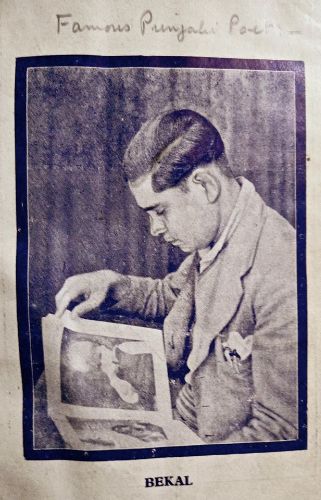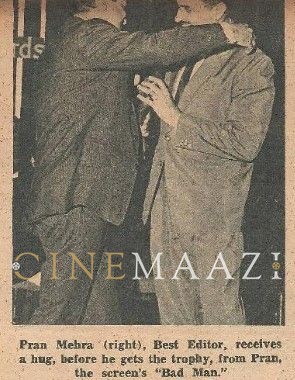Rajesh Khanna : Echoes Of An Era- Peer Pressures

Subscribe to read full article
This section is for paid subscribers only. Our subscription is only $37/- for one full year.
You get unlimited access to all paid section and features on the website with this subscription.
Not ready for a full subscription?
You can access this article for $2, and have it saved to your account for one year.
By the time I was in college, my pocket money of Rs. 500 was hiked to Rs.1000 a month. A sum nobody else received in my group. Also, while in school, I was driven on a scooter, now I was given a car of my own. My mother was worried but had learnt to mellow down. She just accepted that she had to change. And she changed...
The relationship between my father and me was changing too. He watched me enjoy myself with friends but didn't say anything. One day, as I was getting ready to go out, he said, "going out, are you?" I said,
"ji." He said, "it's fine that you plan your holidays so well and I hope that when the time comes, you will plan your career as carefully too. You will have to, someday, begin working, won't you?" Very subtly, yet very clearly, my father had got his point across. It set me thinking. I was not seriously attempting to become a pilot. And I was definitely not keen on joining father's business because it didn't interest me. What interested me was theatre, but how did one join theatre?
My only link to the theatre those days was a distant cousin attached to the INT Drama Company, where V.K. Sharma, whom we called Sharmaji, was the director. I liked Sharmaji and would often hang around the place during his rehearsal time just to stare at the actors. Strange ideas came to mind, watching these actors. Maybe I fantasized being one, but didn't have the courage to say so. But I haunted the place because I secretly hoped and wanted a break. And one day, I got my chance. One of the INT actors fell ill and didn't show up. Sharmaji spotted me in the crowd and asked me if I'd substitute the actor? I nodded. Within seconds, I had crossed over the boundary and was a part of the world, I had so far only dreamt of. But of course, it wasn't all that easy. Despite my best efforts, on the day of the show, I got nervous and goofed up my lines. I played a durban in the play and had only one dialogue which was "ji huzoor, saab ghar mein hain" instead, I said, saab, huzoor ghar mein hain." The director was hopping mad with me. After the show, I ran away without meeting him or anybody else.
Back home I felt miserable. I drank a lot that night and cried a lot too. My friends, to whom I confided my story, consoled me. They said it was too small a matter to lose heart over, but I was inconsolable. I felt so ashamed of myself that not only did I stop going for rehearsals but also would not look my father in the eye, just in case he got to know what I was feeling. For by now, father knew of my flirtation with theatre. Looking back, I feel the disaster was a blessing in disguise. For it filled me with a challenge to prove myself worthy again. It has been an old habit with me that whenever I am rejected, I take it up as a challenge!
I consider myself lucky that I wasn't thrown out of the play. It hurt my ego tremendously and I had to swallow my pride to go back to the same people, the same play, defeated, but it was necessary. And even though I was a mere extra in that play, I felt proud when our play Mere Desh Ka Gaon went on to become INT's most popular play.
Slowly, I was getting out of my nervousness, getting used to being treated like a junior. And juniors never get to play important roles. In short, nobody took me seriously The more patronising they got, the more committed I became towards my work. My college friends got used to me disappearing between lectures to attend theatre. Kader Khan, Sagar Sarhadi, V.K. Sharma were all involved in theatre those days. Except, while they were stalwarts, an authority on plays and performances, I was a small lallu panju whom no one took notice of, and no one cared.
Although they ignored me, I loved going there. I loved the excitement of it all. Ideas, views, opinions clashed. Tea glasses made rounds and cigarette packets were emptied faster than they were lit. The room was always smoke-filled. By the time the rehearsals got over, it was always midnight. We were tired, hungry and often went for a meal to Bhuleshwar. Those days pav bhaji was only available at Khau gali in Bhuleshwar. And boy! What tasty pav bhaji they served there. Even today, whenever I want to eat pav bhaji, I only go to Khaugali of Bhuleshwar.
.jpg/1%20(39)__370x480.jpg)
Our other favourite haunt and slightly sophisticated that too, was Gaylord Restaurant. It is here that I first met B.S. Thappar, who gave me my lead break on stage. It was Thapparsaab who introduced me to Anju Mahendru, my first heroine. I was waiting outside Gaylords in my bell-bottom trousers when a striking face, with an extremely long plait, walked past me. After a while, when I entered the restaurant for my appointment with B.S. Thappar, he introduced me to Anju. "She is Anju Mahendru, your heroine in this play."
Our rehearsals began the following day itself. Sometimes at the Patkar Hall and sometimes at Bhulabhai Memorial Building. Memorial Building had a glamour about it because Geeta Bali had an office in the same building. One day, as I was racing up the staircase, I bumped into her. She was so graceful. "Are you an actor?" she asked spontaneously. I was too dumbfounded. I nodded my head in a gesture which was neither a 'yes', nor a 'no' "Do you want to become one?" she continued. I nodded again. "We're looking for a new face to act in a Punjabi film..." I was so thrilled with this conversation that I went and told all my friends about Geetaji's compliment. They said, "maybe it is true. Why don't we go and verify with a pundit?" We went to one immediately. "You will have nothing to do with glamour," the pundit said rudely "The source that will bring you money is iron. Tum lokhand ka vyapar karoge to faida hoga."
As if to prove the fortune-teller right, a few months later, I read that Geeta Bali was signed for a Punjabi film called Ek Chadar Maili Si (1986) and the new hero to get a break opposite her was Dharmendra. I was heartbroken!! I still don't know why, but I was invited for the launching party of this film. It was at Geeta Bali's residence, Blue Heaven. I went, but felt miserable. I felt out of place too. I was sitting by myself, in their little garden, when Geetaji joined me. "You are feeling unhappy, aren't you?" I think Geetaji felt guilty about giving me hopes. And the truth was, had she not told me about the role that day, I wouldn't have nursed ideas of entering films. But after a compliment from Geeta Bali, I felt I was entitled to a good break in films. Probably she understood my conflict and tried her best to lessen my pain. "Look up," she said to me gently. The sky is filled with stars, one day you will shine too. One day, fame will be yours for the asking." I felt choked and even though I felt hopeless, I felt consoled. What a pity that Geetaji had to die so early. If she were alive, she would have been the first person I'd have gone to meet after my success.
Success didn't happen to me overnight. Even though I was doing theatre, producers were not taking note of me. Sanjeev Kumar, who was with IPTA had got a break and so had many others. But my life was still directionless. My vagabond days, by now, had begun to worry my father The man, who had all along, not uttered a word, called me to his room one day to have a man to man chat. He said, "to pursue a career that forever rejects you, is foolishness. In life, one has to take signals. Maybe films are not for you." In a very dignified way, he had driven home his point. "I'll give you five years to come to a decision. If after five years, I feel, you are not making any headway you will have to join my business. Fair?" "Fair," I replied. And I sincerely believed this. As a father, he could have put pressures on me. He didn't. He didn't even make me feel guilty.
Strangely, not just my father, but my entire family took rather positively to my theatre craze and later my struggle in films. In fact, both my parents, always came to see me perform on stage. I still remember the day I received the selection letter from the Filmfare-United Producers Contest. Out of 1000 candidates, I was the chosen one. I was so happy that I went screaming about the house. My father, came out of his room and I said, "looks like we will not have to wait for five years." He smiled. As weeks passed by, I understood the meaning behind my father's smile. Despite the victory, producers were not exactly queuing outside my house. After what seemed ages, Raj Sippy came to me with an offer for Raaz (1967) opposite Babita!
At last, I was getting a break but my happiness vanished when the director told me that I would have to report every morning at 8 a.m. for a nine o'clock shift. Now, waking up early is just not my style. I am not an early bird. From childhood, I have always risen late. My mother wouldn't allow anyone to enter my room and disturb me. During school days, teachers called me, "Late Latif." In college, it was kind of taken for granted that Jatin does not attend the morning lecture. I could not physically get ready so early So when the director told me about attending shooting early in the morning, my heart sank. Still, I hoped I'd manage somehow. I was wrong.
This article was originally published in a Junior G's supplementary issue -Rajesh Khanna: Echoes Of An Era- issue. The images used are taken from the original article.
About the Author






.jpg)


